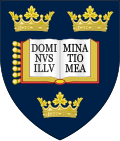- Entrance gate to the Priory surmounted by a statue of the Virgin Mary and inscription by Eric Gill
- Courtyard and bell tower (prior to restoration works)
- Priory Chapel
- Alabaster statue of the virgin in the chapel
 Exterior of Blackfriars on St Giles' | |
| Monastery information | |
|---|---|
| Full name | Priory of the Holy Spirit |
| Order | Dominican Order |
| Established | 1221 |
| Disestablished | 1538 |
| Reestablished | 1921 |
| Dedicated to | Holy Spirit |
| Diocese | Birmingham |
| People | |
| Founder | Bede Jarrett (1921) |
| Prior | Rev. Dominic White O.P. |
| Important associated figures | Thomas of Jorz Timothy Radcliffe |
| Site | |
| Location | Oxford, England |
| Coordinates | 51°45′22″N1°15′37″W / 51.756121°N 1.260206°W |
| Website | Priory website |
Blackfriars Priory (formally the Priory of the Holy Spirit) is a Dominican religious community in Oxford, England. Its primary work is the administration of two educational institutions: Blackfriars Studium, a centre of theological studies in the Roman Catholic tradition; and Blackfriars Hall, a constituent permanent private hall of the University of Oxford. The current prior of Blackfriars is Dominic White. The name Blackfriars is commonly used in Britain to denote a house of Dominican friars, a reference to their black cappa, which forms part of their habit.
Contents
- History
- Blackfriars Studium
- Notable Friars
- Burials at Blackfriars Abbey, Oxford
- Gallery
- References
- External links
Blackfriars is located in central Oxford on St Giles', between the Ioannou Centre for Classical and Byzantine Studies and St Cross College.






